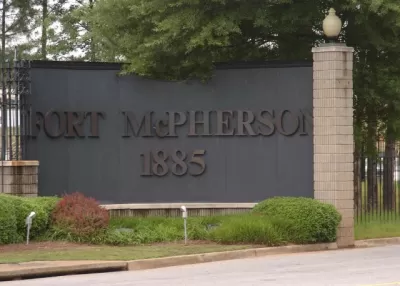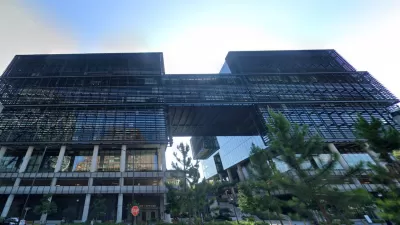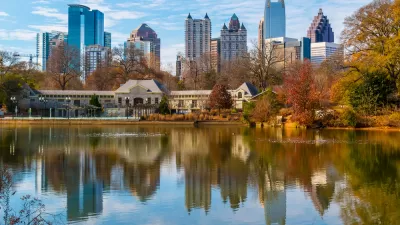The land adjacent to Tyler Perry Studios will be developed into an entertainment district with offices, restaurants, and retail.

Atlanta's decommissioned Fort McPherson, which "spans 488 acres four miles southwest of downtown Atlanta, or three stops on the airport-bound MARTA transit line," will soon be home to an "inclusive, high-energy community with a creative hub at its heart," reports Josh Green in Urbanize Atlanta. "[Tyler] Perry, the filmmaker, and a Texas megachurch pastor, T.D. Jakes, have struck separate deals to purchase and develop the remaining Fort Mac acreage, as the Fort McPherson Implementing Local Redevelopment Authority relayed earlier this month."
According to Green, "[r]enderings recently published by architecture and planning firm SHAPE show a masterplan that would cover the totality of that acreage, creating a hub 'where history, art, and culture intersect,' arranged around a central greenspace."
The Reconstruction-era Fort McPherson operated as a U.S. Army base for over a century until it closed in 2011. In 2015, Tyler Perry started construction on his 330-acre studio complex. "The authority has been searching for a new partner to recreate the studio-adjacent acreage since developer Stephen Macauley backed away (with a buyout) in 2019."
FULL STORY: Next to Tyler Perry Studios, Fort McPherson masterplan emerges

Manufactured Crisis: Losing the Nation’s Largest Source of Unsubsidized Affordable Housing
Manufactured housing communities have long been an affordable housing option for millions of people living in the U.S., but that affordability is disappearing rapidly. How did we get here?

Americans May Be Stuck — But Why?
Americans are moving a lot less than they once did, and that is a problem. While Yoni Applebaum, in his highly-publicized article Stuck, gets the reasons badly wrong, it's still important to ask: why are we moving so much less than before?

Using Old Oil and Gas Wells for Green Energy Storage
Penn State researchers have found that repurposing abandoned oil and gas wells for geothermal-assisted compressed-air energy storage can boost efficiency, reduce environmental risks, and support clean energy and job transitions.

Updating LA’s Tree Rules Could Bring More Shade to Underserved Neighborhoods
A new USC study finds that relaxing Los Angeles’ outdated tree planting guidelines could significantly expand urban tree canopy and reduce shade disparities in lower-income neighborhoods, though infrastructure investments are also needed.

California's Canal Solar Projects Aim to Conserve Resources and Expand Clean Energy
California’s Project Nexus has begun generating electricity from solar panels installed over irrigation canals, with researchers and state agencies exploring statewide expansion to conserve water and boost clean energy production.

HHS Staff Cuts Gut Energy Assistance Program
The full staff of a federal program that distributes heating and cooling assistance for low-income families was laid off, jeopardizing the program’s operations.
Urban Design for Planners 1: Software Tools
This six-course series explores essential urban design concepts using open source software and equips planners with the tools they need to participate fully in the urban design process.
Planning for Universal Design
Learn the tools for implementing Universal Design in planning regulations.
Heyer Gruel & Associates PA
City of Moreno Valley
Institute for Housing and Urban Development Studies (IHS)
City of Grandview
Harvard GSD Executive Education
Salt Lake City
NYU Wagner Graduate School of Public Service
City of Cambridge, Maryland




























